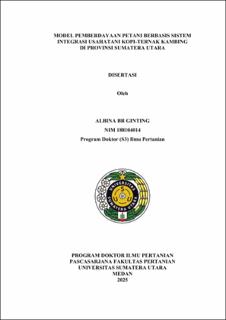Model Pemberdayaan Petani Berbasis Sistem Integrasi Usahatani Kopi-Ternak Kambing Di Provinsi Sumatera Utara
Farmer Empowerment Model Based on Coffee Farming-Goat Farming Integration System in North Sumatra Province

Date
2025Author
Ginting, Albina
Advisor(s)
Purba, Edison
Chalil, Diana
Hanafi, Nevi Diana
Metadata
Show full item recordAbstract
The problems faced by farmers in general are weak capital, limited land, lack of understanding, so that the level of use of agricultural inputs is not optimal, and inefficient business scale. This raises the question of whether community empowerment activities for farmers are a strategy that provides solutions to sustainable coffee agricultural development. For this reason, it is necessary to study how successful the empowerment of community farmers is, and what factors influence empowerment so that an empowerment model is obtained that can increase the income of coffee farmers. This study aims to: 1) analyze the economic benefits (income and efficiency) of integrated coffee and goat farming; 2) analyze the influence of internal environmental variables on the development of integrated coffee and goat farming; 3) analyze the influence of external environmental variables on the development of integrated coffee and goat farming; 4) analyze the influence of internal environmental variables on farmer empowerment; 5) analyze the influence of external environmental variables on farmer empowerment; 6) find a model of farmer empowerment based on integrated coffee and goat farming.
This study was conducted in three districts in North Sumatra Province, namely Karo Regency, Simalungun Regency, and Samosir Regency. The determination of the research location was carried out purposively with the consideration that the three areas are fostered by the Starbuck Farmer Support Center (SFSC) for farmer empowerment with the concept of integrated coffee and goat farming. The sample selection technique was carried out using the census method with a sample size of 169 families. The data collection method in this study was carried out by means of Focus Group Discussion (FGD) and distributing questionnaires. The data analysis method is carried out mathematically to analyze the income and efficiency of integrated farming. The next stage for measuring the indicators of each independent and dependent variable is carried out using a Likert scale, then to find a model of farmer empowerment of the integrated coffee-livestock farming system using structural equation modeling (Structural Equation Modeling/SEM).
The results of the study concluded that: 1) the economic benefits obtained by farmers from integrated farming are an increase in farm income and a decrease in farm production costs; 2) the internal environment of the farm has a positive effect on the development of integrated farming; 3) the external environment has a positive effect on the development of integrated farming of coffee and goat farming; 4) the internal environment of the farm has a positive effect on farmer empowerment; 5) the external environment of the farm has a positive effect on farmer empowerment; 6) the empowerment model applied to integrated farmers is a participatory empowerment model that combines bottom-up and top-down approaches.
Based on the research results, the following suggestions can be given: 1) integrated farmer empowerment activities will be able to run well if supported by both internal and external farming environments; 2) farmers still have the opportunity to increase the number of livestock raised considering the area of land that is still adequate; 3) farmers need to allocate the use of labor outside the family to raise livestock so that they are not constrained in dividing their time between farming and livestock businesses; 4) farmers still need training and assistance to combine and process animal feed so that integrated farming can run sustainably; 5) this study still has limitations because it does not compare farmers who are not SFSC fostered, and does not compare farmers before and after being empowered. For this reason, further research is needed to obtain more optimal and accurate information.
